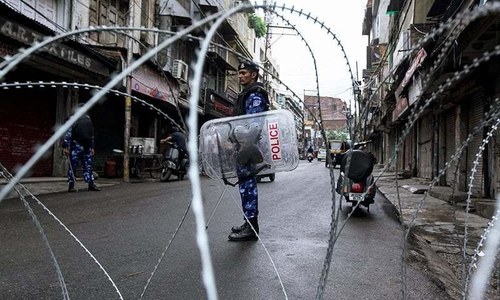US deplores detentions, internet ban in occupied Kashmir

WASHINGTON: The chief US diplomat for South Asian affairs, Alice Wells, has expressed concern over continued detentions and internet-shutdown in occupied Kashmir, days before her visit to New Delhi for bilateral talks.
“Closely following US ambassador to India and other foreign diplomats’ recent trip to Jammu & Kashmir. Important step,” she wrote in a tweet posted on the official website of the US State Department’s Bureau of South and Central Asian Affairs.
“We remain concerned by detention of political leaders and residents, and internet restrictions. We look forward to a return to normalcy,” she added.
Kashmir has no internet access for more than 150 days.
Wells says Washington closely following diplomats’ visit to Valley
Ms Wells will reach New Delhi on Jan 15 on a three-day visit that includes talks with senior Indian officials on bilateral and regional issues. She will then proceed to Islamabad on a similar, three-day visit that will begin on Jan 19.
On Thursday, the Modi government arranged a “guided tour” for some New Delhi-based diplomats to the occupied valley — the first after India scrapped the region’s autonomous status five months ago.
“European Union envoys declined an invitation, apparently because the visit did not include meetings with three former chief ministers, who continue to be in detention and whose parties dominated Kashmiri politics,” reported an American broadcaster, Voice of America.
But US ambassador to India, Kenneth Juster, accompanied the group, which met Indian military officials, politicians and journalists selected by Indian security services.
India showcased the visit to support its claim that normalcy is returning to the troubled region, where a strict clampdown imposed in August paralysed life as authorities imposed a dusk to dawn curfew. Indian authorities also imposed unprecedented restrictions on both social and conventional media and disconnected cellphones. Indian security forces also arrested hundreds of Kashmiris, including senior politicians. Most of them remain in detention and the internet suspended.
The diplomats from more than a dozen countries were driven in a motorcade from the airport amid tight security and the areas they visited were also selected by Indian officials.
“Although access for diplomats, rights activists and foreign journalists to Kashmir has always been controlled, India has further restricted travel to the region for both foreigners and Indian opposition leaders,” VOA noted.
The US broadcaster reported that Indian opposition parties were criticising the government for not allowing their leaders to visit the region while taking diplomats on what they called a “guided tour”.
“Essentially, the government wants to demonstrate that everything is normal in Kashmir, which is far from reality,” said Congress Party leader Manish Tewari.
Besides Ambassador Juster, the diplomats who visited Kashmir represented Norway, Vietnam, South Korea, Brazil, Uzbekistan, Bangladesh and the Maldives.
“It’s all about trying to improve the optics,” Manoj Joshi, a foreign affairs analyst at the Observer Research Foundation in New Delhi told VOA. “Around the world, the government’s handling of the domestic situation has been getting huge amount of negative attention.”
Although Indian succeeded in “persuading” Washington to sends its ambassador, “its other good friend France hid behind the European Union decision not to go on the guided tour,” reported an Indian media outlet, ThePrint.
“Brazilian ambassador to India, Andre Aranha Correa do Lago, didn’t travel to Srinagar although his name was on the list,” the report added.
Published in Dawn, January 13th, 2020













































